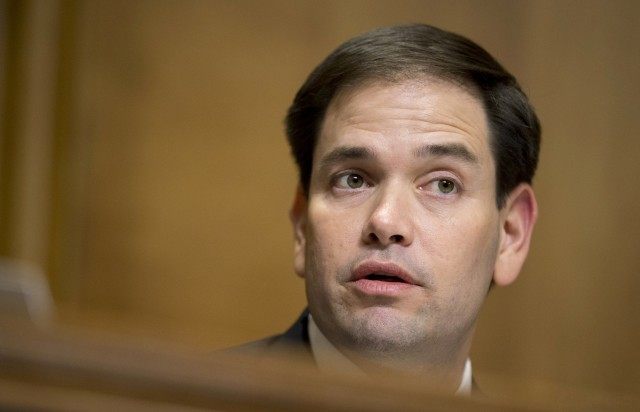Sen. Marco Rubio is walking back rhetoric on President Obama’s executive amnesty, but he still hasn’t committed to a timeline when he would end it if he’s elected president, even though he has called it unconstitutional.
Speaking to reporters in New Hampshire, Rubio said President Obama’s executive order to defer deportation for children of illegal immigrants to the United States (DACA) would have to end – even without legislation to fix the problem in Congress.
“DACA is going to end and the ideal way for it to end is that it’s replaced by a reform system that creates an alternative,” Rubio said. “But if it doesn’t, it will end. It cannot be the permanent policy of the United States,” he told voters in on Tuesday.
Rubio’s admission that DACA has to “come to an end” is not new, as he continues to be vague on a firm commitment or a timeline for ending it if elected president.
“Ultimately there will come a point where it will have to end,” Rubio told NBC News reporter Kasie Hunt in April. “Maybe not in six months, but at some point it will have to end.”
In the same interview, Rubio explained that a sudden ending of DACA would be “disruptive” for illegal immigrants – currently working and enjoying government benefits as a result of the program.
“I wouldn’t say that we would immediately reverse that one,” he said in April, when asked if he would end DACA if elected president.
But Rubio’s rhetoric has shifted slightly since April, admitting that DACA “would end” even without a legislative fix. He previously supported immigration reform that would apply to DACA recipients before ending the program.
Rubio also told voters in New Hampshire that DACA was an “unconstitutional policy” according to CNN.
Rubio’s position leaves him in the baffling situation of being unwilling to commit to immediately revoking a program he is describing as unconstitutional. That could add further complications to his potential presidency, if he failed to end DACA after taking an oath of office swearing to uphold the Constitution.
In response to questions from Breitbart News, Rubio aides were unable to provide a specific timeline on which a President Rubio would end DACA, but repeated his assurance that it would come to an end if he’s elected president.
At this point, Rubio appears willing to let DACA expire during his presidency, but hasn’t committed to ending the program or revoking the work permits issued by USCIS. The work permits issued under DACA, beginning in 2012, usually apply to a two-year period.
Earlier this week, Breitbart News reported details of an interview he did in April with Univision anchor Jorge Ramos in which he expressed “hope” that some sort of immigration reform would pass and end DACA, but he was not demanding that it “tomorrow or this week or right away.”
Other Republican presidential candidates have criticized Rubio’s position on the issue, most recently New Jersey Governor Chris Christie.
Christie commented on Rubio’s position during an interview with conservative radio show host Laura Ingraham earlier this week.
“Maybe Marco doesn’t believe that the executive order is illegal, and if he doesn’t he should say that,” Christie said. “And, he’s welcome to that opinion, obviously there’s lots of Democrats who would agree with that. But, he needs to say that.”
Obama has insisted that both of his executive amnesty orders would remain in place until Congress acted legislatively on immigration reform. His actions, however, infuriated Republicans — even those who supported immigration reform, effectively poisoning the well for any consensus on the issue.
Newly-elected House Speaker Paul Ryan has stated that any immigration reform during the Obama presidency would be politically unworkable.
“The House of Representatives will not vote on comprehensive immigration legislation as long as President Obama is in office,” Ryan wrote in a USA Today op-ed. “And the reason is simple: The American people can’t trust him to uphold the law.”
The biggest question, therefore, is what a Republican president would do with both of President Obama’s amnesty actions — DACA and DAPA — after assuming office.
Many Republican candidates running for president have vowed that they would end both programs immediately on the basis that they are illegal — including Christie.
“I’ve said very clearly that the President’s conduct is illegal … If those executive orders are illegal, which I believe they are, then they need to be revoked the first day you get in office,” Christie said during his interview with Ingraham.

COMMENTS
Please let us know if you're having issues with commenting.